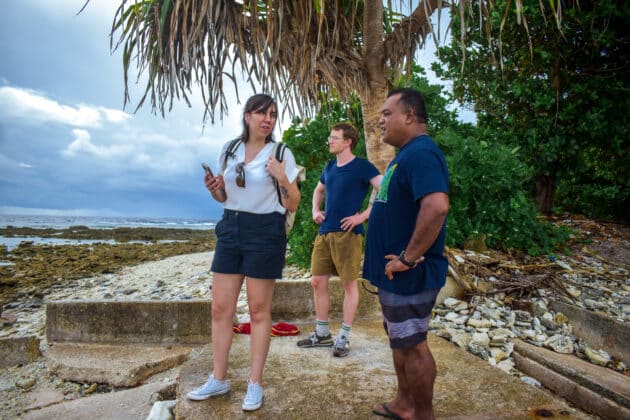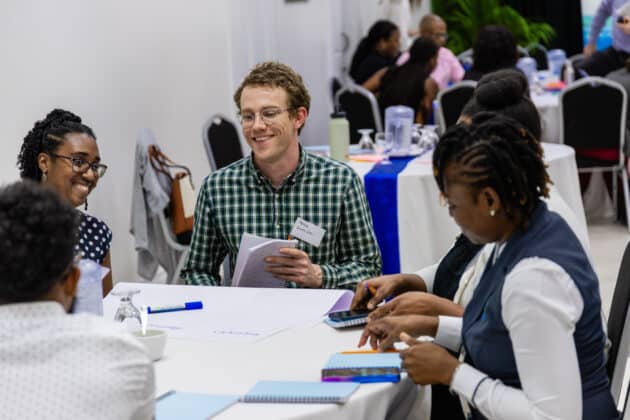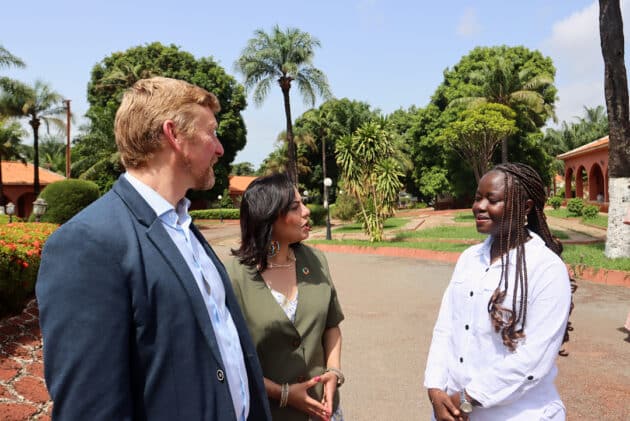Through our work with Small Island Developing States, one thing has been clear: SIDS have no shortage of blue economy expertise. From their leadership in Global Plastics Treaty negotiations to their strong history of traditional ecological knowledge, island states are recognised as ocean stewards for good reason.
Nevertheless, SIDS face clear and mounting challenges in managing their plastic problems. Since we began working with Small Island States in 2019, two clear themes have emerged as key barriers to implementing change: resourcing and finance.
That’s why we are pleased to be focusing on implementation to ensure that our country partners can overcome these barriers and turn their plans into impactful, coordinated action.

How it started – creating the roadmap to a future freed from plastic pollution
Over the past year, Common Seas has been working closely with five SIDS to co-develop national policy plans to tackle plastic pollution and drive the transition to a more resilient blue economy.
This work is supported by funding from the UK Government’s Sustainable Blue Economies Programme, which aims to enhance the resilience of Small Island Developing States (SIDS).
We have been working with Guinea-Bissau, Grenada, Saint Lucia, Papua New Guinea and Tuvalu to develop a comprehensive understanding of plastic pollution in each country and identify policy opportunities to reduce it through both upstream and downstream measures.
Together, we have developed ambitious National Action Plans (NAPs) and policy documents setting the roadmap for each country to cut plastic pollution by up to 80% over the next decade.
Three draft NAPs have now been presented to governments, and we published the Report on Plastics Policy Recommendations for Saint Lucia in September.
These are major milestones in the transition to a sustainable blue economy.
But it’s not just about data and policy documents. Our aim is to chart practical pathways to tackle plastic pollution, identifying the key levers to change and the people best placed to move them.
With new SBE funding, we are now supporting SIDS to take these important next steps in bringing their plans to life.

What’s next – major steps on the journey to a sustainable blue economy
Building on our collective progress, the new funding from the UK Government will extend the programme through March 2026, allowing Common Seas to support implementation planning, starting with Saint Lucia and Guinea-Bissau.
We will focus on unlocking finance and strengthening institutional capacity to support governments in prioritising the most impactful interventions, securing the right finance, and building the skills and capacity they need to make it happen.
Despite stewarding over 30% of the world’s ocean, only 0.2% of climate finance goes to SIDS. As some of the most under-financed countries, the funding available to SIDS is often volatile and severely under-serves their needs.
For example, research by the Climate & Development Knowledge Network suggests that non-LDC SIDS constitute around 3.4% of the total adaptation needs in the Global South. However, they currently only receive around 2.2% of ODA funding and 1.7% of multilateral lending flows.
To achieve the potential plastic pollution reduction projections set out in their NAPs, SIDS governments need a clear picture of the financing required to implement policy change – and the most accessible, reliable sources available to them.
Institutional capacity also proves a consistent challenge. This is intertwined with funding limitations, but also stems from the material reality of small, often remote countries.
Government departments are often small, with individuals covering a wide range of responsibilities. This is particularly evident in international policymaking spaces such as Global Plastics Treaty negotiations, where SIDS often have very small delegations compared to larger countries.
In a recent piece by Economist Impact, Common Seas’ Director of Partnerships, Thais Vojvodic explained how, “…despite often having extremely small delegations – St Lucia had only one delegate managing multiple contact groups at once – they made the most of their presence.”
However, this issue extends beyond multilateral spaces – capacity building is also vital on the national level.
Going forward, we will be working with Saint Lucia and Guinea-Bissau to develop two key activity streams that will help to overcome these barriers. First: cost modelling and financial assessments, and second, embedding technical expertise within government to support priority activities.

Collaborations to end plastic pollution
Overcoming these barriers effectively requires not only capacity building, but also meaningful collaboration.
Our partnerships are founded in collaboration as the primary conduit to achieving tailored solutions for SIDS that can be implemented in the long term.
So far, we have convened more than 187 stakeholders across public, private, and community sectors, fortifying policy coordination and engagement.
We are also exploring new ways to drive coordination across regions and sectors.
As part of this, we have been conducting collaborative research into the potential for a regional approach to EPR to support SIDS in addressing plastic waste management challenges.
The research, undertaken alongside Circulearth and an expert advisory group, suggests that a regional approach could address common challenges to EPR in SIDS, leading to enhanced economies of scale, improved logistics, increased market influence and more secure, flexible finance for waste management needs.
But it could also present a number of co-benefits across sectors and society, from enhanced supply chain resilience to informal sector integration and improved public health.
Whilst global negotiations may continue to stall, these projects demonstrate that SIDS are wasting no time in taking bold, collaborative steps to drive meaningful change.
Looking ahead, we are excited to deepen our partnerships and continue accelerating action to drive a just transition to a sustainable future, freed from plastic pollution.

